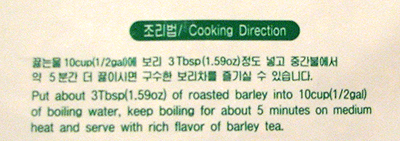Share This
For four years after she graduated from college, my daughter lived in South Korea. Each time I visited her there, I found a pitcher of boricha, or barley tea, in the refrigerator. Breakfast, lunch, and dinner, we would drink a glass of barley tea instead of water. At the time, my life was not centered around whole grains, as it has been the last several years, so my only thought was, “Okay, that’s another weird but enjoyable Korean food I never saw before…”
But now, as my radar seeks out interesting grain products, I was intrigued to find barley tea for sale in a local Asian market. There on the shelf was a big bag labeled “Roasted Barley” that consisted of nothing more than barley kernels, still in their hulls, toasted to a deep brown color. “What the heck do you do with this?” I asked myself, and flipped it over, to read:
There it was! The secret of the boricha, right in my hands. I had to buy it.
In my daughter’s tiny Korean kitchen, I’m not sure how I escaped watching her make the barley tea, but I must have, because I was surprised to find out how simple it is.
Step 1: Boil a quart of water.
Step 2: Throw in 2-3 tablespoons of roasted barley and simmer for about 5 minutes.
Step 3: Strain out the barley kernels.
I’m sure I could nuke it in the microwave, too, but I always follow directions the first time. You can drink barley tea hot or cold, plain or with sugar or honey, maybe a little lemon if you like. It’s caffeine free, with a strong nutty taste, but less astringent than tea from tea leaves.
Koreans swear that barley tea is essential to the digestion, and relieves constipation. The Japanese, who call barley tea mugicha, also claim important health benefits. In fact, Japanese research has documented the many antioxidants found in barley tea, and its apparent benefits for improving blood flow. Japanese food giant Kagome, presented the latter research at the Japanese Society of Soft Drink Technologies in 2004, reporting that “continuous intake of barley tea helps improve the fluidity of blood. Moreover, as the density of alkylpyrazine, a key substance in the tea flavor, increases, [blood] fluidity increases further.”
So far, I’ve only had one cup, which I’m sure doesn’t count as “continuous intake,” so I’m not sure if my blood flow has improved yet. But I do know that barley tea is a refreshing addition to my usual herb tea choices, and I’m going to be able to make hundreds of cups of tea for the same amount of money I usually spend for a box of a dozen herbal tea bags. What’s more, I love the idea of promoting grain teas as “soft drink technology.”
Want to try barley tea for yourself? Be one of the first ten people to email me with your name and address, and I’ll send you enough of the toasted barley to make two quarts. (Cindy)


Comments
Actually, a visit to the USDA's nutrient database shows that dry yellow corn has less than 1% sugar (0.64%). Compare that to Kamut® at 7.84% sugar, or spelt with 6.82% sugar, and you'll see that corn is actually one of the lowest in sugar content of the grains for which sugar is noted in the database.
The best drink, from a health point of view, is probably water. If we can give a little natural flavor to the water we drink -- with barley or by throwing a slice of lemon in the water, or any other way -- we may be encouraged to drink more water. Even if the health benefits are small, it's a good thing. Refreshing, as you say.
Add a Comment